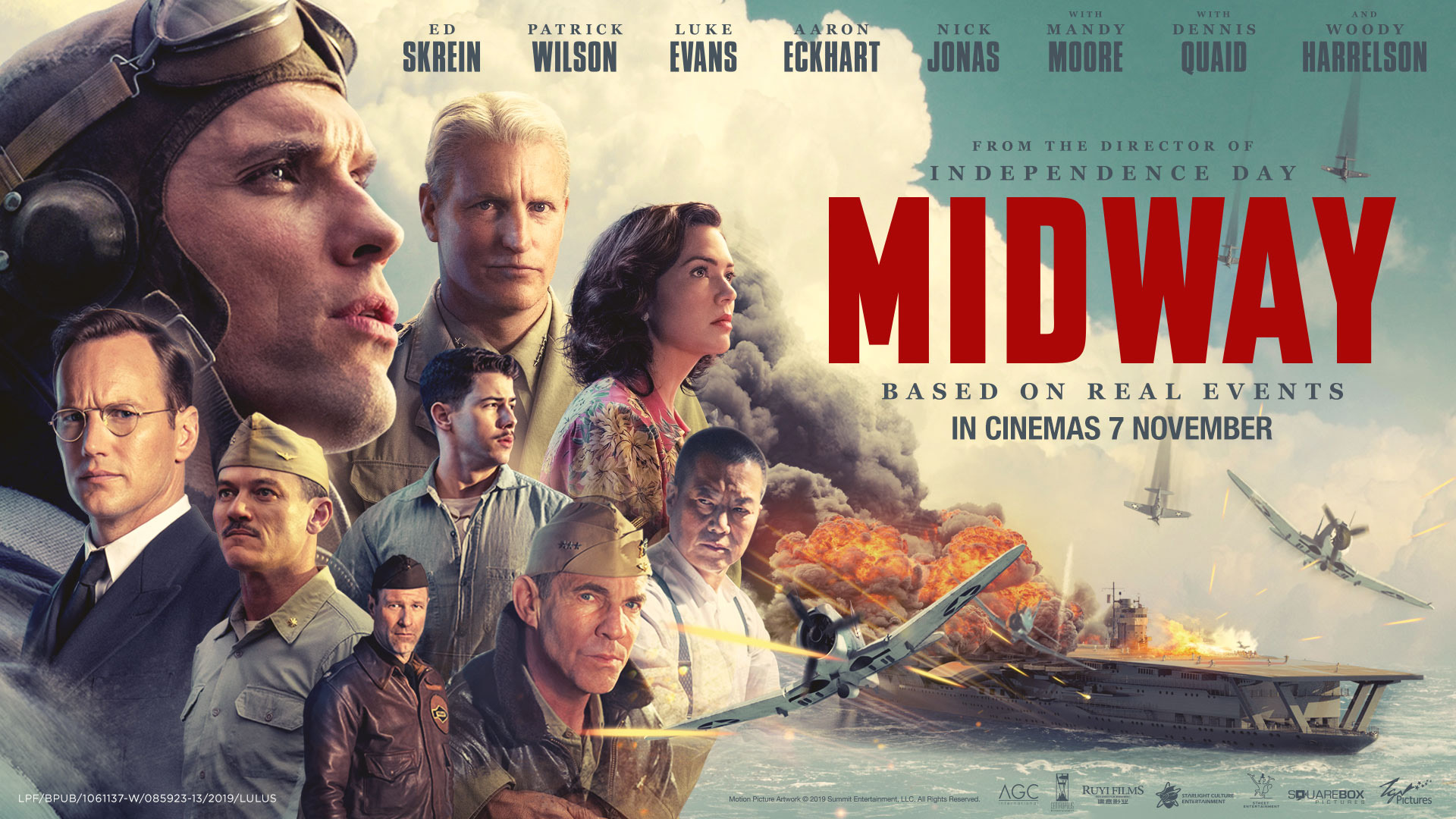It’s somewhat ironic that I first saw a trailer for Roland Emmerich’s Midway at a screening of Sam Mendes’ 1917. The contrasts between the two movies highlight everything that makes Mendes’ film excel, while Emmerich makes his standard, enjoyable-enough-but-empty popcorn epic.
In 1917, what CGI is used is mostly all-but invisible; instead, Mendes focuses on the human drama of two soldiers struggling across a battlefield. In Midway, the CGI practically is the star, as war machines roar, and garish technicolor explosions fill the screen with a near-constant barrage of sound and visual fury. Human drama is almost absent and almost none of the characters are developed in any meaningful way.
Roland Emmerich is renowned for creating ridiculously dazzling, hugely entertaining, but ultimately hollow visual spectaculars. In 1917, everything feels so viscerally real that the audience can all but smell the rotting corpses and feel the cloying mud of No Man’s Land. In Midway, by contrast, everything is so bright, shiny and clean that it is like watching a video-game cutscene (pilots continuously flying combat missions with open cockpits doesn’t help, either).
When the topic is end-of-the-world science-fiction such as Independence Day or 2012, Emmerich’s films are hilariously entertaining. But, when he turns his hand to a serious historical drama (first with The Patriot in 2000, and now with Midway), his shortcomings are all too evident.
Characters walk on and off screen of Midway without ever having anything really compelling to say and without generating any real interest for the audience. The terrified young sailor so central to the Pearl Harbor opening scenes thereafter vanishes without a trace. Lt. Col. James Dolittle crashes in Japanese-occupied China but then disappears from the story, except for a brief appearance in the film’s coda. And so it goes, for two and a half hours.
Even major characters, such as Edwin Layton (played by Patrick Wilson), the intelligence officer driven to make good for the failure to anticipate Pearl Harbor, are barely sketched out. Other historical figures, like Chester Nimitz (Woody Harrelson) and Bull Halsey (Dennis Quaid) are well enough served by their respective actors, but given barely any flesh by the script. Toyokawa Etsushi and Asano Tadanobu, as Admiral Yamamoto and Rear Admiral Yamaguchi respectively, at least provide some interesting inter-character drama (more, oddly enough, than between any of the American fighters and their buddies or wives) as they wrestle with conflicts of doubt and bushido (honour).
The only character with anything resembling an arc, dive bomber pilot Dick Best, still remains woefully underdeveloped. For most of the film, Best is little more than an annoying jock, all swagger and chewing-gum. There is some hint given that the qualities that make Best so annoying off the battlefield – recklessness, over-confidence to the point of arrogance, utter disregard for his and others’ lives – are precisely those which transform him into the necessary hero when the bullets are flying. Unfortunately, the treatment is so perfunctory and ham-fisted – limited to basically a blink-and-you-miss-it locker-room pep talk – that Best comes off more as an irritating jerk than the hero the historical character deserved.
That, ultimately, is the failure at the heart of Midway. One of the greatest naval battles in history and a turning-point of the Pacific War becomes little more than a staging ground for just more of Emmerich’s flash-and-bang visual spectaculars. Which is fine when it’s the whole of California sliding into the sea in 2012, but rather less than satisfying when it’s about real people who genuinely gave everything to help save the world in 1942.
Nobody makes big, dumb, fun disaster epics quite like Roland Emmerich. Unfortunately, Roland Emmerich is far less suited to epic historical drama. Midway is at least a mildly entertaining way to pass a couple of hours, but the subject matter deserves much, much more.
If you enjoyed this BFD article please consider sharing it with your friends.

